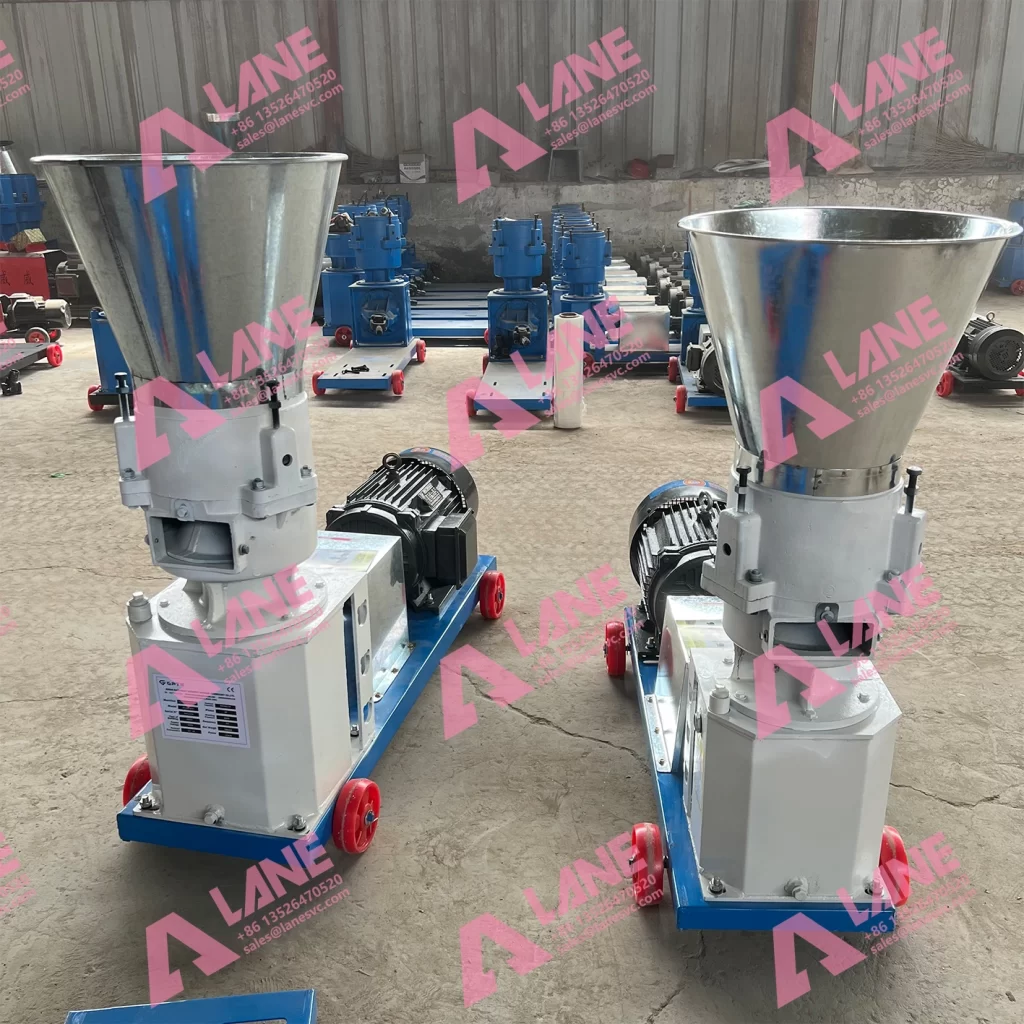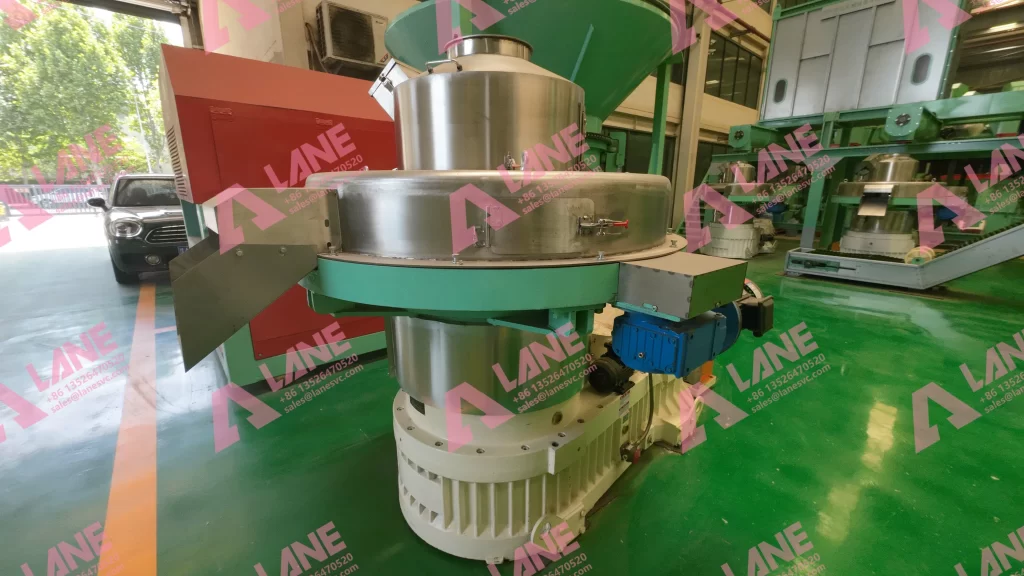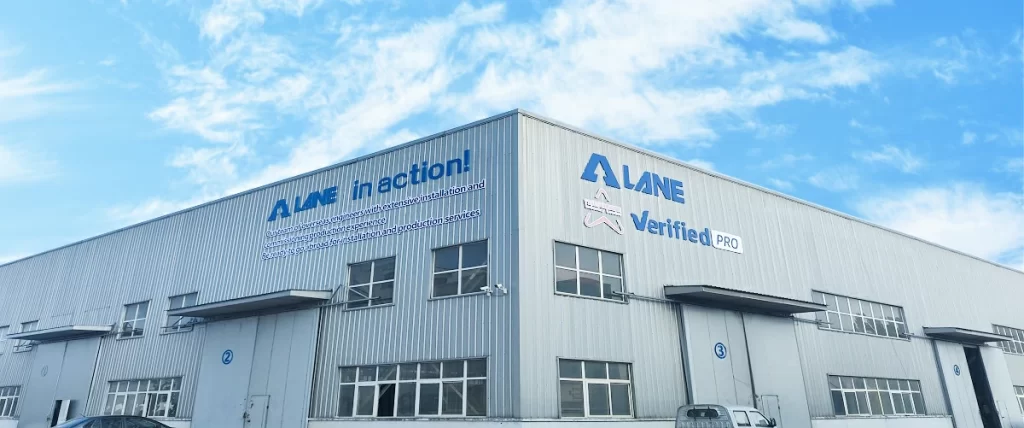As the world turns toward renewable and eco-friendly energy solutions, the demand for wood pellet machines continues to rise. Wood pellets, made from sawdust, shavings, wood chips, or other biomass residues, are now one of the most popular forms of green fuel for heating systems, power generation, and industrial applications. Compact, high in calorific value, and easy to transport, these pellets represent an important step toward replacing fossil fuels with sustainable alternatives.
At LANE Heavy Industry, we specialize in developing advanced wood pellet machine solutions that help customers worldwide turn local biomass waste into profitable, renewable energy products. Two of the most widely used pelletizing systems in today’s market are the flat die wood pellet machine and the ring die wood pellet machine—each designed to meet different production capacities and operating environments. Understanding their features, advantages, and applications is key to choosing the right equipment for your project.
What Makes a Wood Pellet Machine Essential
The principle behind a wood pellet machine is simple yet powerful. It compresses finely ground biomass under high temperature and pressure, forcing it through die holes to form dense, cylindrical pellets. This process increases the material’s energy density and makes it easier to handle, store, and burn efficiently.
A complete wood pellet production process typically involves crushing, drying, pelletizing, cooling, and packaging. But the heart of it all lies in the pelletizing stage, where raw material becomes a uniform, high-quality pellet. Whether you are an individual producer looking to recycle wood waste or a commercial operator running a biomass fuel plant, the right wood pellet machine can dramatically improve efficiency and product quality.
Flat Die Wood Pellet Machines: Simple, Reliable, and Cost-Effective
For small to medium-scale pellet production, the flat die wood pellet machine remains a favorite choice. Its design is compact and easy to maintain, consisting of a flat die plate and rollers that press the biomass through the die holes. The resulting pellets fall directly below the machine, ready for cooling and packaging.
Flat die pellet machines are particularly suited for small workshops, farms, or start-up biomass projects. They are available in various power configurations—electric, diesel, or PTO-driven—making them adaptable to different working environments. Despite their smaller size, these machines can achieve stable output levels ranging from 100 to 800 kilograms per hour, depending on the model and material type.
Producers appreciate this type of wood pellet machine for its simplicity and affordability. It requires minimal training to operate, consumes relatively little energy, and can handle a wide range of raw materials, including wood sawdust, crop stalks, rice husks, bamboo, and even sunflower shells. For anyone looking to enter the biomass fuel market with a modest investment, a flat die wood pellet machine is an excellent starting point.

Ring Die Wood Pellet Machines: Industrial Power for Continuous Production
When production demands rise and efficiency becomes a priority, the ring die wood pellet machine takes center stage. This industrial-grade equipment is engineered for large-scale, continuous pellet production, capable of processing several tons of material per hour. It operates with a circular die where the rollers press material from inside the ring, forcing it outward through the die holes. The result is a smoother, denser, and more uniform pellet suitable for commercial sale or export.
Compared to flat die models, ring die pellet machines feature higher compression ratios, which translate to greater pellet durability and higher energy output per kilogram. Their design also distributes wear more evenly across the die and rollers, extending the machine’s lifespan and reducing maintenance costs. While they require a higher initial investment, they offer a significantly lower cost per ton of pellets over time.
This type of wood pellet machine is ideal for biomass fuel plants, power generation facilities, and industrial boiler suppliers. Many of LANE’s clients in Southeast Asia, Africa, and Eastern Europe have installed ring die systems to meet growing domestic and international pellet demand. Some operate 24 hours a day, producing thousands of tons per month, ensuring consistent supply to energy producers and heating networks.

Choosing Between Flat Die and Ring Die Pellet Machines
The choice between these two designs depends largely on production goals, available resources, and project scale. A small farm, for example, might generate limited amounts of sawdust or agricultural residue and need a machine that’s easy to move and maintain. In that case, the flat die wood pellet machine offers the right balance of capacity and simplicity.
However, for those running a biomass processing plant or supplying pellets to the industrial market, the ring die wood pellet machine is the more appropriate option. It provides higher throughput, better pellet quality, and more automation options, including digital monitoring and PLC control systems for precise operation.
To make the decision easier, here’s how these two types generally compare in real-world applications:
| Parameter | Flat Die Machine | Ring Die Machine |
| Typical Output | 100–800 kg/h | 1–10 tons/h |
| Investment Level | Low | Higher |
| Energy Efficiency | Good | Excellent |
| Automation | Manual or Semi-auto | Fully automatic |
| Pellet Density | Medium | High |
| Maintenance | Simple | Moderate |
| Ideal Users | Small producers, farms | Industrial pellet factories |
In practice, both machines can produce high-quality wood pellets when properly operated. The real difference lies in production volume, energy consumption, and labor intensity.
Why LANE Heavy Industry Stands Out
For years, LANE Heavy Industry has been committed to providing sustainable and intelligent machinery solutions for the fertilizer and biomass industries. Our wood pellet machines reflect this commitment through precision engineering, energy efficiency, and long-term durability. Each machine is built from high-strength steel, with specially heat-treated dies and rollers to ensure maximum compression efficiency and extended service life.
Beyond product quality, what truly distinguishes LANE is its focus on customer experience. Every client receives personalized support—from project evaluation and layout design to installation guidance and after-sales service. For new biomass entrepreneurs, our engineers can assess your available raw materials and recommend the most suitable wood pellet machine or even a complete pellet production line. For industrial clients, we provide fully customized systems, integrating crushers, dryers, conveyors, coolers, and packaging machines into a seamless, automated production process.
Our after-sales service includes one-on-one technical training, spare parts supply, online troubleshooting, and optional on-site installation. Many international clients have chosen LANE not only for equipment performance but also for the peace of mind that comes with reliable support and transparent communication.
Global Projects and Customer Success
LANE’s wood pellet machines are now running successfully in more than 40 countries. A recent project in Malaysia, for instance, involved the installation of a 2-ton-per-hour ring die wood pellet production line. The client, who previously struggled with waste management in a sawmill, now produces over 30 tons of high-density wood pellets daily—selling them to biomass power plants and industrial users. The transformation turned what was once waste into a profitable, eco-friendly business.
In Eastern Europe, several clients operate compact flat die wood pellet machines in rural areas, where small workshops use local wood shavings and sawdust to produce heating pellets for local communities. These projects highlight how versatile LANE’s machines are—capable of serving both small local operations and large industrial enterprises.
Operating and Maintaining a Wood Pellet Machine
Regardless of model type, regular maintenance is essential to ensure consistent performance and longevity. Operators should always monitor material moisture content—ideally between 10% and 15%—to prevent blockages or uneven pellet formation. Lubricating moving parts, checking die wear, and cleaning feeding areas can prevent downtime and maintain stable output.
At LANE, every wood pellet machine is delivered with detailed operation manuals and maintenance instructions. Our technical support team is available 24/7 for remote guidance, ensuring customers can resolve issues quickly and continue production without interruption.
Sustainability and Economic Benefits
The global shift toward low-carbon energy sources has placed wood pellets in the spotlight as a key contributor to renewable energy goals. Unlike fossil fuels, wood pellets are carbon-neutral—the CO₂ released during combustion equals the amount absorbed during the tree’s growth cycle. Moreover, turning waste wood into pellets reduces landfill use, promotes forest residue utilization, and provides new income opportunities for local producers.
For many developing regions, investing in a wood pellet machine is not just an industrial decision—it’s an environmental and economic one. By converting biomass waste into valuable fuel, producers can cut disposal costs, create local jobs, and contribute to cleaner air and energy independence.
The wood pellet machine has become one of the most important tools in the movement toward renewable, sustainable energy. Whether it’s a compact flat die wood pellet machine for local users or a powerful ring die wood pellet machine for industrial-scale production, both play an essential role in transforming biomass waste into clean energy resources.

By choosing LANE Heavy Industry, customers gain access to advanced technology, dependable quality, and dedicated support from a team with deep expertise in biomass engineering. From concept to commissioning, we help you create a pellet production solution that delivers long-term efficiency, profitability, and environmental impact.
Clean energy starts with simple innovations—and the wood pellet machine is one of them. With the right equipment, the right support, and a vision for sustainability, turning waste into energy is no longer a dream—it’s the new standard.
For more details, please feel free to contact us.
Henan Lane Heavy Industry Machinery Technology Co., Ltd.
Email: sales@lanesvc.com
Contact number: +86 13526470520
Whatsapp: +86 13526470520